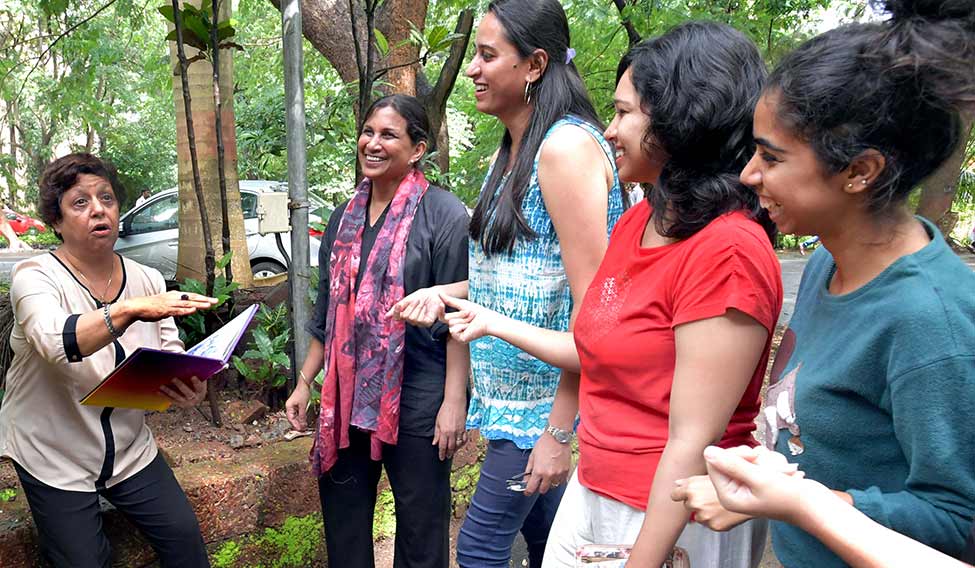It is the weekend but the English department of Mumbai University is buzzing. The students are excited—their favourite professor who has introduced them to the romance of Shakespeare and ideas of masculinity through contemporary Indian advertising is going to teach them storytelling today. A classroom in one corner of the building is being feverishly readied for the session. An elegantly dressed Coomi Vevaina enters and promptly lends an efficient hand to speed up the process.
Introducing her team, which includes her future daughter-in-law, Vevaina gives an overview of her two decades of storytelling experience. “I once narrated Sleeping Beauty with a change. What if she had chocolate brown skin? A dark-skinned student remarked, ‘Oh, but then Sleeping Beauty won’t land her prince!’ It made me think, ‘Here’s a readymade consumer for all the fairness creams!’ I said to her, ‘But what if she didn’t need a prince?’ That’s how I introduced ideas of feminism and stereotyping to my students....” We are all living by scripts, she says, our myths are our realities, mostly to our detriment.
In between explaining concepts about storytelling, Vevaina does an animated narration—that includes tapping her toes and clicking her fingers—of one of her favourite children’s poems, Beeblebean and Beebleboo, about a stone wall built between two kingdoms and invites a discussion on ‘the self versus the other’. “It could be like the India-Pakistan situation, where divisions keep people on both sides away from each other? Or, like the casteism in our country?” she offers during an ensuing discussion with the engaged audience.
Vevaina’s work as a teacher in the early 1990s led her to realise that boring moments in classrooms or seminars could be enlivened with stories that would be remembered better than dull information. But the actual import came in the wake of the Mumbai terror attack of 2008. “People went through over 60 hours of terror, but no one was thinking of the traumatic effect on children. I asked my students to do a presentation in schools—the importance of non-violence in the face of violence. Kids were free to write poetry, essays, make art....” In 2011, she held the city’s first international storytelling festival under her newly formed team, Wordfully Yours, at the university, which was flagged off by actor Naseeruddin Shah. The Tata group later invited her to do programmes for their corporate staff in storytelling.
“Besides entertaining or passing on tradition, values, culture through words, as a storyteller the idea is to invite perspectives in a non-preachy manner and encourage people to think for themselves. Even corporates find narrative therapy effective to resolve conflicts and promote reasoning,” she tells us later at her cosy home at Grant Road over a mug of strong herbal tea concocted by her chartered accountant husband, a passionate supporter of his wife’s work, who takes care of the paperwork and finances.
Did she always want to be a storyteller? “I was a naughty child who loved playing. My parents actually tied me up on occasion! I hated studying but wanted to be a teacher since I was three, even writing to Santa Claus asking for chalk and a blackboard as Christmas presents. Growing up, I enjoyed drama and elocution. Passion for the language led me to become a professor of English and a storyteller,” she says, with a smile.
Vevaina’s group promotes three self-coined concepts through their story work: psycho-literacy (awareness of how humans think and feel), socio-literacy (awareness of inter-cultural differences) and eco-literacy (awareness of our symbiotic connection with earth). Can storytellers be political? “As novelist Dionne Brand says, ‘No language is neutral.’ While our three concepts could be seen as ideologies, we seek to be ideology free, the focus being to end divisive ways of operating. The kind of stories we choose to tell would reflect that—pro-life, egalitarianism....”
When one thinks of storytelling, the proverbial image of a narrator sitting under a tree with listeners around him/her comes to mind. Does she count herself as a modern version of that? “Unlike traditional storytellers, we are ‘sharers’, not ‘givers’ of knowledge. The aim remains to entertain and influence listeners in positive ways.” How does she look at storytelling in India? “Ours has always been an oral culture. Storytelling is being revived today because people are tired of realism, if you go by the Harry Potter phenomenon. Today if you teach people management lessons through storytelling, they would remember it better.”
Vevaina says the old fairytales we have grown up with are ‘toxic tales’. “We have worked with these stories in the last decade where we have realised Grimm’s fairytales aren’t for children as much as they are for adults. Beauty seems to be the most important aspect in most of these tales. The Noddy series promote racism, sexism and upper ‘classness’. With stories such as Cinderella and Sleeping Beauty, we offer possibilities of counter narratives. Not every story needs to begin with once upon a time.”
UNFAIR FAIRYTALES
Popular children’s series on the character Noddy and his friends by Enid Blyton, initially much liked, came under attack later for being racist because they featured the black-faced villainous woollen dolls known as golliwogs, who were considered to be Noddy’s archenemies. When Blyton’s granddaughter, Sophie Smallwood, wrote a new adventure for the series in 2009, she eliminated the golliwogs to avoid further controversy.
Recently, a lesson plan for teachers called Racism/Sexism in Disney was uploaded by an unknown teacher in the United Kingdom. It decoded how fairytales such as Sleeping Beauty, Cinderella and Snow White promote sexism.








